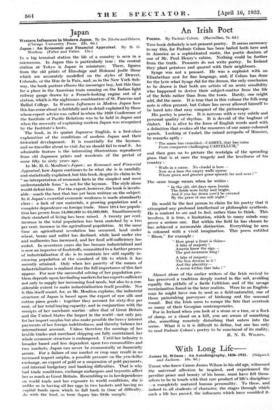An Irish Poet
Poems. By Padraic Colton. (Macmillan, 7s. Gd.)
Tins book definitely is not peasant poetry. It seems necessary to say this, for Padraic Coll= has been hailed both here and in America as a sophisticated rustic, the poetic denizen of one of Mr. Paul Henry's cabins. Nothing could be further from the truth. Peasants do not write poetry. In Ireland they plant potatoes and quarrel with their neighbours.
Synge was not a peasant. He was a euphuist with an Elizabethan zest for fine language, and, if Colum has done for the lyric what Synge did for the drama, the only conclusion to be drawn is that both are artists of an acute sensibility who happened to derive their subject-matter from the life of the fields rather than from the town. Hardy, one might add, did the same. It is true that in this volume the folk-song note is often present, but Colurn has never allowed himself to be lured into that easy conquest of the picturesque.
His poetry is precise. It is nervous with a very subtle and personal quality of rhythm. It is devoid of the bugbear of dialect. He is alive to the force of English words used with a definition that evokes all the resources of our many-coloured speech. Looking at Cashel, the ruined acropolis of Munster, he remarks aptly : " The name has crumbled—CASHEL that has come From conqueror-challenging CASTELLUM," and then goes on to picture the nostalgia of the spreading grass that is at once the tragedy and the loveliness of his country : Walls in a name. No citadel is here.— Now as a lane the empty walls uprear Where green and greener grass spreads far and near I" The same image recurs when lie writes : "in the old, old days upon Lmish The fields were lucky and bright, And if you lay down you'd be covered By the grass of one soft night."
He would be the last person to claim for his poetry that it attempted any profound intellectual or philosophic synthesis. He is content to see and to feel, rather than to think. This involves, it is true, a limitation, which to many minds may prove a serious one. But within the field he has chosen he has achieved a Memorable distinction. Everything he sees is coloured with a vivid imagination. This poem entitled `• Bison," for example :
"How great a front is thine— A lake of majesty !
Assyria knew the sign— The god-incarnate king !
A lake of majesty— The lion drowns in it ! And thy placidity— A moon within that lake !"
Almost alone of the earlier writers of the Irish revival he has preserved a tradition deeply rooted in the soil, avoiding equally the pitfalls of a facile Celticism and of the savage recrimination found in the later realists. Were he an English- man he might have run to seed as a field-naturalist, one of those painstaking purveyors of birdsong and the seasonal round. But the Irish seem to escape the fate that overtook so many of their Georgian contemporaries.
For in Ireland when you look at a stone Or a tree, or a flock of sheep, or a cloud on a hill, you are aware of something else, something remotely disturbing that enters into the scene. What it is it is difficult to define, but one has only to read Plain& Colum's poetry to be convinced of its reality.
R. N. D. Wicsos.








































 Previous page
Previous page